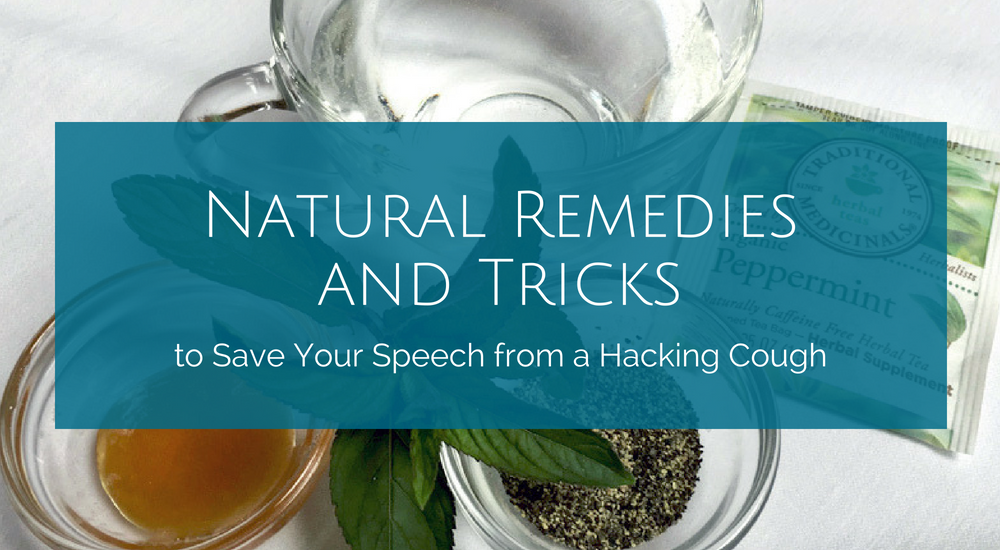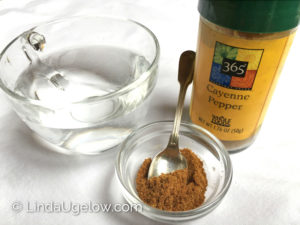
Your upcoming week is full of speaking engagements–a podcast, a livestream, some scheduled videos and a talk at a local women’s business association. All great stuff. Except, after five days of a bad cold, you’ve got an uncontrollable cough. The kind that once you start, you can’t stop.
So what do you do? Cancel everything?
I pondered this recently when I was looking at such a week ahead after several days in bed. There was my Facebook show on Monday, an online expert interview on Tuesday, a podcast on Wednesday and my TV show on Thursday. Could I get through them without hacking my lungs out?
Not only does coughing feel awful, it totally interrupts the flow and makes the audience feel uneasy and distracted with concern.
Thanks to Google and lots of experiments on myself and my family over the years, I have an arsenal of remedies at hand.
Happily, I was able to get through each speaking event without embarrassing myself. And I’ll show you exactly how you can do that if you find yourself in a similar situation.
The solutions below are all home remedies, which you can create easily with simple ingredients from your pantry.
My Favorite Cough Suppressants
1. Gargle with baking soda. When you have a hacking cough, your voice is compromised. Your higher range has disappeared and your sound is husky (though, arguably, sexy.) Gargling will coax back more range in your voice while delivering some healing to the injured tissues.
How to make it: Pour a cup of warm water and stir in a teaspoon of baking soda. The amount doesn’t have to be exact. Warm water is best as it is soothing but doesn’t burn your throat. Then, as you gargle, make a tone in your most comfortable low note. Explore a few other tones up and down. See how high you can go without pushing or straining. You can also gargle a song, like “Row, Row, Row Your Boat.”
Gargling will open up a few more notes to your range and give more melody to your voice.
After gargling, you can swallow the solution if you can tolerate it, or you can spit it out. There are many benefits to drinking baking soda which you can read about here.
2. Gargle with salt. If you absolutely cannot stand the taste of baking soda, consider swapping it with half a teaspoon of sea salt. Sea salt has the ability to draw out fluids from inflamed tissue, draw out irritants and loosen mucus, according to studies at the Mayo Clinic.
How to make it: Add the salt to a cup of hot water and let it cool to warm. After gargling, spit it out.
 3. Black pepper peppermint tea. I have to confess, I never enjoyed the taste of black pepper. But after learning about its many health benefits and experiencing firsthand the quelling of my cough, I’ve become a raving fan. When I recorded my TV show last week and still had some lingering coughs, I kept this tea in my mug beside me. It helped me get through the show without anyone realizing I had a cough.
3. Black pepper peppermint tea. I have to confess, I never enjoyed the taste of black pepper. But after learning about its many health benefits and experiencing firsthand the quelling of my cough, I’ve become a raving fan. When I recorded my TV show last week and still had some lingering coughs, I kept this tea in my mug beside me. It helped me get through the show without anyone realizing I had a cough.
How to make it: Add a heaping half teaspoon of black pepper into a cup of hot peppermint tea. With a lid on, let the tea steep for a few minutes. Add a bit of raw honey to taste.
4. Variations: Try making a chai spice tea by adding a stick of cinnamon, whole cloves, cardamom, turmeric, fresh or dried ginger and plenty of black peppercorns and ½ teaspoon ground black pepper to a large pot of water. You can begin drinking it after boiling for 20 minutes. But keep it simmering throughout the day.
Truthfully, you can add black pepper to any tea. I’ve even added it to coffee!
Warning! Make sure you get high-quality ground pepper, as it has been shown to contain molds if not properly cured or is held too long. Or you can buy the peppercorns and grind them yourself.
 5. Cayenne water. I swear that I’ve averted a cold by eating a super spicy meal. My daughter at college told me she loves adding cayenne tincture to water and drinking it throughout the day. I kept a bottle of this with me when attending a three-day conference in a chilly hotel. It effectively stopped me from coughing.
5. Cayenne water. I swear that I’ve averted a cold by eating a super spicy meal. My daughter at college told me she loves adding cayenne tincture to water and drinking it throughout the day. I kept a bottle of this with me when attending a three-day conference in a chilly hotel. It effectively stopped me from coughing.
How to make it: I see no need to buy an expensive tincture. Ground cayenne works just fine. Start with one-eighth of a teaspoon to a glass and stir it up and see if it is tolerable. Adjust up or down from there. If you use a bottle of water, remember the pepper tends to settle at the bottom of the bottle, so shake it up before taking a sip.
 6. Garlic with honey. While garlic doesn’t directly affect the symptoms of a cough, its great anti-bacterial property makes it a handy home immune booster. Many people, such as myself, don’t relish eating a lot of raw garlic and stinking like it. Following this tip, you will neither taste the garlic going down nor smell like garlic yourself. Read more about the benefits of garlic here.
6. Garlic with honey. While garlic doesn’t directly affect the symptoms of a cough, its great anti-bacterial property makes it a handy home immune booster. Many people, such as myself, don’t relish eating a lot of raw garlic and stinking like it. Following this tip, you will neither taste the garlic going down nor smell like garlic yourself. Read more about the benefits of garlic here.
How to do it: Peel and chop a clove of garlic, leave it to “air” for 5-10 minutes to release the allicin (an enzyme with medicinal benefits). Then mix it with a little bit of honey. Pick it up on a teaspoon, put the whole glob into your mouth and swallow it with water as if you were swallowing a pill.
My Favorite Self-care Routines
Besides remedies you can ingest, here are two more suggestions you can do at home that don’t involve swallowing anything.
6. Hot steam treatment. Steaming your face will loosen congestion, clear your nasal passages, increase circulation and soothe a cough. It opens the pores of your skin and makes you feel refreshed. Steam your face before speaking in public to loosen up and soothe your passages. Then do it again before going to sleep.
How to do it: Pour some boiling water in a saucepan, then put your face over it. Relax and breathe in the steam. If you have essential oils at home, you can put a drop of eucalyptus, chamomile or peppermint into the water to enhance the clearing of your passages. You can also cover your whole head with a towel for a few minutes. This will keep the steam in.
 7. Tapping and massage. I’m a big believer in massage. It supports circulation of the lymphatic system and releases tension. Particularly with a cold or cough, you will benefit from easing the muscles and structures of your throat, neck and chest.
7. Tapping and massage. I’m a big believer in massage. It supports circulation of the lymphatic system and releases tension. Particularly with a cold or cough, you will benefit from easing the muscles and structures of your throat, neck and chest.
How to do it: Start with your face by putting your fingers or knuckles of both hands on your jaw and gently loosening it up. Stroke around your chin, your cheeks, nose, eyes and temples. Follow what feels good to you.
Then move down to your neck. With your thumbs and fingertips, gently explore the area underneath the entire jaw line, your throat, larynx, back and sides of your neck, and the collarbone areas. Don’t be afraid to press and poke around. Doing that may make you cough a little bit, but I have found that a little cough in this case can be beneficial and a sign of release and loosening up.
Lastly, rub and press your sternum in front of your ribs and massage in between each of the upper ribs on your chest. Press your fingers up and under the lowest rib.
Finish off by tapping firmly with your fingertips all over your chest for several minutes. This is known as “thumping your thymus.” I believe this stimulates the thymus gland that makes T cells. I don’t have any research to back it up. But my acupuncturist recommends it. I love how it feels and find it invigorating. I encourage you to do your own research to form your own judgment. In any case, it wouldn’t hurt to give it a try.
As a public speaker, you will occasionally find yourself in a situation where the show must go on despite your being sick. Whether it’s on camera or in person, you’ll definitely want to show up in the best way possible. With the remedies and self-care routines suggested here, you’ll be able to do just that.
If you find this article helpful, please share it with your public-speaker friends. If you want to get more tips on public speaking, subscribe to my newsletter by filling in the form below.






If you’re getting hoarse, you may also want to make sure that you aren’t pushing your volume through a constricted throat. Make sure that you spend 5-15 minutes connecting with and warming up your voice before you speak. I expect you’ll notice a difference.
Have lost my voice twice now mid-speech due to GERD and while I’ve managed to contain the coughing at speeches to date, I worry a lot about hoarseness or coughing at 2 I have coming up. Thrilled to find this info, I’m all over the baking soda and black pepper tea! Thanks for the share Linda.
Great post! Just a word of warning, though, sometimes it’s best NOT to suppress a cough. Coughing helps protect your lungs from the mucus in your head. For children and pregnant women, it especially might not be a good idea to suppress a cough if you are sick.
A few other things to help your immune system kick a cold is to avoid sugar (it really reduces your immune system’s strength) and avoid dairy (it can increase mucus production). Eating cruciferous vegetables helps make your immune system stronger.
Thank you for the brilliants and well researched methods to heal a cough or cold.
I appreciate the common sense of your healthy remedies and the scientific research that supports the cures suggested.
Linda,
These are all excellent natural remedies. I’ve been using some of these since I was a child and passing to my kids. I now know how wise my grandma was!
Great wise traditions to keep alive. I’m bookmarking this page! Love it!